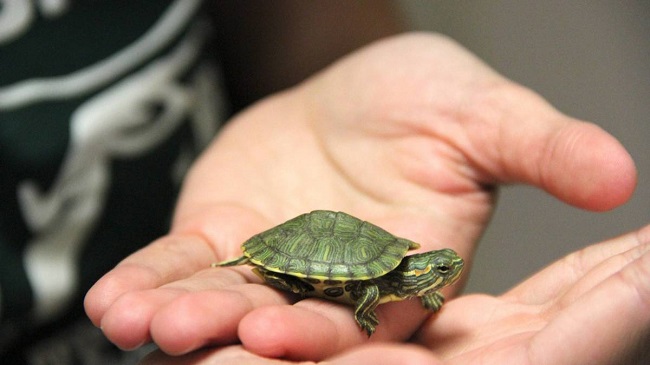Turtles are unique and fascinating creatures that can make wonderful pets. Their calm demeanor, longevity, and interactive nature have made them particularly popular among pet owners.
Among these, mini turtles, due to their compact size, are an appealing choice for those with limited space.
In this article, we will explore in detail the world of pet mini turtles, reviewing important facts, lifespan, distinctive traits, and essential care requirements.

The Fascinating World of Mini Turtles
Mini turtles refer to smaller species of turtles, such as the Mud Turtle, Musk Turtle, and certain types of Map Turtles.
Read Also:
These species generally grow to lengths of 4 to 6 inches, making them manageable pets, particularly for those with space constraints.
Lifespan of Mini Turtles
One aspect that attracts people to turtles is their remarkable lifespan. With proper care, mini turtles can live between 20 to 50 years, sometimes even longer. This extended lifespan makes owning a mini turtle a significant long-term commitment.
Distinct Traits of Mini Turtles
Mini turtles are known for their gentle disposition and interactive behavior. They are typically docile, making them a good choice for families with children.
However, every turtle has its personality, and while some may enjoy human interaction, others may prefer more solitude.
It’s also worth noting that mini turtles, like other reptiles, are ectotherms, meaning they rely on their environment to regulate their body temperature. Therefore, they require specific heating and lighting conditions within their habitat.
Care Essentials for Pet Mini Turtles
Habitat
The habitat setup for mini turtles should consist of a tank large enough for swimming and a dry area for basking. A 20 to 40-gallon tank is usually a good starting point. You’ll also need a water filtration system to maintain water cleanliness.
Temperature and Lighting
Maintaining proper temperature gradients in the tank is essential. You’ll need a submersible heater to keep the water temperature around 75-80°F, while the basking area should be around 85-90°F. UVB lighting is also essential for the turtles to synthesize vitamin D3, which helps them absorb calcium.
Diet
Mini turtles are omnivorous, requiring a diet balanced in animal protein and plant matter. A mix of commercially available turtle pellets, leafy vegetables, and small amounts of fish or insects makes for a well-rounded diet.
Healthcare
Like all pets, mini turtles can suffer from various health issues, including respiratory infections, shell problems, and vitamin deficiencies. Regular vet check-ups can help detect and treat these problems early.
Legal Considerations
Before acquiring a mini turtle as a pet, it’s important to understand the laws and regulations regarding turtle ownership in your area.
Some species are protected or even endangered, making their trade illegal. Moreover, in some regions, the sale of turtles under a certain size is restricted due to the risk of salmonella.
Ethical Sources for Pet Mini Turtles
Always ensure that you source your mini turtle from a reputable breeder or rescue organization. This not only ensures that you receive a healthy pet but also discourages unethical practices such as wild capturing.
Education and Awareness
Educate yourself and your family about proper handling procedures to prevent the spread of diseases like salmonella, which can be transmitted from turtles to humans.
Simple practices, like washing hands before and after handling your turtle, can greatly reduce the risk.
Understanding the True Costs of Pet Mini Turtles
Beyond the initial cost of purchasing a mini turtle, the setup (including tank, filter, heater, and UV light), ongoing costs of food, and potential vet bills can add up. Ensuring you are financially ready to provide for your pet is an essential step in responsible pet ownership.
The Reward of Being a Mini Turtle Owner
Mini turtles can offer a unique pet ownership experience. Observing their behaviors and interactions with their environment can be both relaxing and educational.
With the correct care, your mini turtle can become a long-lived, fascinating member of your family.
Read Also:
Conclusion
Owning a pet mini turtle is a delightful and rewarding experience. However, it’s crucial to remember that these small creatures have specific care needs and a long lifespan, making them a significant commitment.
By thoroughly understanding their needs and providing a suitable environment, diet, and healthcare, you can ensure your mini turtle thrives and becomes a cherished part of your family.
























